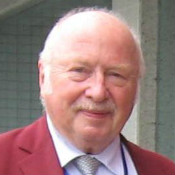This is part two of our ‘Behind the Scenes’ series. You can find Part I here.
Today we would like to present two of our biggest supporter organisations, the International Society for Systems Sciences (ISSS) and the International Federation for Systems Research (IFSR). Their background is not only of personal interest, but also historically important. So without further ado, let us introduce you to them:
International Society for the Systems Sciences (ISSS) 
The ISSS is among the first and oldest organizations devoted to interdisciplinary inquiry into the nature of complex systems. Founded in 1954 by Ludwig von Bertalanffy, Kenneth Boulding, Ralph Gerard, and Anatol Rapoport.
The initial purpose of the society was to encourage the development of theoretical systems with the following principal aims:
- to investigate the isomorphy of concepts, laws, and models in various fields, and to help in useful transfers from one field to another;
- to encourage the development of adequate theoretical models in areas which lack them;
- to eliminate the duplication of theoretical efforts in different fields; and
- to promote the unity of science through improving the communication among specialists.
Until today, the ISSS has expanded its scope beyond purely theoretical and technical considerations to include the practical application of systems methodologies to problem solving. It now provides a forum where scholars and practitioners from across the disciplinary spectrum, representing academic, business, government, and non-profit communities, can come together to share ideas and learn from one another.
Its 56th annual meeting is taking place on July 15-20 2012 at San Jose State University, California.
Meet David Ing, President of ISSS:
1. What does the ISSS mean to you?
The ISSS is a diverse community of systems thinkers with a depth and breadth of insight into the world, unlike any other professional organization I have encountered. They are lifelong learners with a natural curiosity and wisdom, with a welcoming style of openness and sharing amongst experts and novices alike.
2. Why should other people show interest in the ISSS? What will they experience or learn?
The ISSS provides opportunities to learn in interactive collegiality, beyond disciplinary lines. Marshall McLuhan said “One thing about which fish know exactly nothing is water, since they have no anti-environment which would enable them to perceive the element they live in”. As someone who works in business and technologies, I learn from biologists and ecologists. People who join ISSS meetings should always expect to encounter a point of view that they hadn’t previously considered, so they will gain more insight into the way the world works … or could work.
3. What is your current position or responsibility with the ISSS?
I’m the president of the ISSS through July 2012. I’m leading the development of the program for the 56th Annual Meeting of the ISSS, scheduled for July 15-20 in San Jose, California. The theme for the meeting is “Service Systems, Natural Systems”. There’s more information at http://isss.org/world/sanjose-2012 .
///
International Federation for Systems Research (IFSR) 
The IFSR was founded 1981 and is a non-profit, scientific and educational agency, constituted of member organizations from various countries. The overall purpose of the Federation is to advance cybernetic and systems research and systems applications and to serve the international systems community.
The Federation
- organizes scientific conferences, tutorials, seminars, workshops and lectures as well as associated exhibitions.
- cooperates with organisations and associations with similar interests world-wide, especially cooperations at national and international scientific events and supports the participation of scientists at scientific events world wide.
- has the following major means of publications: The Journal of Systems Research and Behavioural Science, The IFSR Book Series on Systems Science and Engineering, The IFSR Newsletter, Proceedings of Fuschl Conversations, IFSR W. Ashby Memorial Lectures.
- establishes Working Groups and Project Groups including operation of appropriate data bases and communication means.
- cooperates with standardisation organisations and other standard-producing organisations, including development of standards.
- researches, formulates and publishes opinions to issues of education, training and application in the domain of systems.
- supports education and training in the area of Systems Research and Systems Engineering, in and outside of academic institutions.
- provides information on issues of systems thinking, systems research and systems design to decision makers, to domain specialists and the broader public via all relevant media.
In the words of the president of IFSR, Gary Metcalf, the reason why people should show interest in the ISFR, is that although “a number of the systems organizations have been around for over 50 years, the importance of using systems approaches to deal with massively complex issues is just beginning to be appreciated by leaders and decision-makers. There are many different theories and models which fall under the category of systems, but all share some common traits about working with problems in context rather than in isolation.” Visit Gary Metcalf’s blog here.
show interest in the ISFR, is that although “a number of the systems organizations have been around for over 50 years, the importance of using systems approaches to deal with massively complex issues is just beginning to be appreciated by leaders and decision-makers. There are many different theories and models which fall under the category of systems, but all share some common traits about working with problems in context rather than in isolation.” Visit Gary Metcalf’s blog here.
Please also meet Prof. Dr. Gerhard Chroust from IFSR and visit his website here:
1. What does the IFSR mean to you?
People should urge the systemic societies they are members of to communicate more intensively with the IFSR.
3. What is your current position or responsibility with the IFSR?
I am the Secretary General of the IFSR and try to keep the IFSR involved in systems activities and as such support our member societies.
(Photo Credit Post Banner: Flickr @ blackbutterfly)



